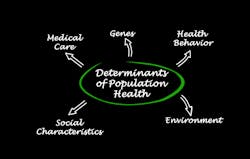A new report from the Institute for Healthcare Improvement (IHI) recommends several steps to help establish a set of standardized quality measures for the emerging field of complex care.
The May 2020 report, titled “Measuring Complexity,” builds on the work of the Blueprint for Complex Care released by IHI, the National Center and the Center for Health Care Strategies (CHCS) in 2018. Among other things, the Blueprint stated that “complex care programs may be housed in many settings, ranging from healthcare clinics and health plans to community-based organizations and social service agencies. Because of the broad set of stakeholders who are providing complex care, there is risk of duplicating and siloing efforts, which may stymie progress.” The Blueprint identified measurement as a primary area in need of attention and standardization because it would allow groups to track patient outcomes and help determine the effectiveness of complex care programs across the United States.
The Measuring Complexity report, co-authored by IHI’s Heidi Bossley, M.S.N., M.B.A., and Keziah Imbeah, MSc, finds that current complex care programs use several criteria to identify people who would be considered to have complex health and social needs, including their age, chronic conditions such as diabetes or heart disease, behavioral health, what insurance they have, and how many times they use the emergency department or are admitted to the hospital. “These programs also have access to different types of data such as insurance claims and medical records but not everyone uses the same sources and may not collect the same information. Because of this variation between programs, we need to identify a standard way to define these individuals and how to collect that data,” the report states.
The same challenge exists, the authors say, in identifying what areas are most important to measure since complex care programs may prioritize different measures. “Most track whether they are able to decrease use of the healthcare system and/or costs along with other measures on specific areas of interest to that program. Based on our literature searches and conversations with experts, we propose important areas or domains of measures that expand the current focus beyond just cost and identified what measures or measure concepts might be considered for use within each area. We also identified areas where other solutions such as reporting stratified data or creating standards might be better solutions.”
Among the recommendations the report makes are:
• Determine a process for measure development/alignment based on the intended use(s) of the measures. If the goal is to compare how well programs provide care and improve patient outcomes, then there will need to be agreement on who should be considered “complex” and what data will be used.
• Target measurement, standards, and data stratification within five domains: Effectiveness/quality of services, equity, health and well-being, service delivery, and cost/utilization.
• Develop and/or select a core set of measures for longitudinal evaluations of program effectiveness paired with additional sets based on the populations of interest and prioritized domains of care.
The authors also suggest that the next step is to form a quality measures expert working group to create a set of measures, standards, and data stratification within several domains and begin to advance the field of complex care.


